Music Reviews
AN EVENING WITH AFRICA'S LADY OF SONG - Margaret Ferguson accompanied by Jonathan Ellis
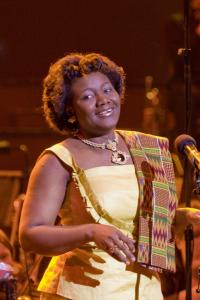
Buxton Methodist Church, 23 July
Way back in the 1960s, the late Ray Charles made a best-selling album called Genius + Soul = Jazz. If there were a recording of tonight's concert, it should be called Margaret Ferguson + Music = Delight.
The first part of the programme consisted of traditional pieces from composers including Mozart and Ponchielli. A highlight was 'Pace Pace, mio Dio' from Verdi's 'La Forza del Destino'. Margaret captured the drama of the piece and also displayed great strength in the contralto range as well as her usual soprano. She set the scene for the various musical items, performing confidently in Italian and also in German for Richard Strauss' 'Malven', which is believed to be the last work that Strauss wrote. To round off the first half of the concert, Verdi's 'Merce, di lette', from 'The Sicilian Vespers', provided a rousing finale which left the audience eager for the second part of the programme.
After the interval, Margaret gave a demonstration of Ghanaian 'talking drums' with a number of volunteers from the audience joining in. Then it was back to business with a selection of more modern songs. It was good to hear less commonly performed songs such as 'Meadowlark' from Stephen Schwartz's 1980s musical 'The Baker's Wife', and Cole Porter's 'The Tale of the Oyster'.
Margaret was accompanied at the piano by Jonathan Ellis, with whom she has performed for 16 years. Over that time, he told me, they have got to know each other's musical ways and this shows very clearly. Their light-hearted chemistry on Cole Porter's 'I Hate Men' really enhanced the performance.
After the end of the official programme, the applause warranted a number of encores. Have you ever heard 'How Much is That Doggie in the Window' and 'She's a Lassie from Lancashire', delivered in operatic style, seamlessly merged with an aria from La Traviata? Well, Margaret and Jonathan pulled off this unlikely musical feat to the delight of the audience.
The whole evening was a joy to attend. Margaret's undoubted vocal talent and vivid performances, as well as the variety of music she includes in her programmes, are hugely enhanced by her warmth and friendly relationship with the audience. To sum up the evening in a word - 'Encore!'
Paul Berman
MONTEVERDI VESPERS OF 1610 - Ensemble MDCX

St John's Church
This was a very challenging project. Detailed programme notes explained that a new edition of the work had been prepared by John Kilpatrick, the musical director of Ensemble MDCX, from facsimiles of the part books and that the Ensemble was made up of two choirs and specially chosen instrumentalists with the intention of getting as close as possible to Monteverdi's intentions. Of course there is no way of knowing if the search for authenticity was successful particularly because Monteverdi tended to use just whatever instrumentalists that were available to him and therefore different performances would be very likely to sound different But what can be said is that there were moments such as the opening antiphon and the concluding Magnificat when the choir combined with the trombones and trumpets and the strings and organ to produce the most glorious uplifting sound, greatly enhanced by the acoustic of St John's.
We are now so used to hearing Montiverdi's music that it is easy to forget that his compositions were revolutionary. The abandonment of polyphonic church music and the adoption of coloratura and other ornamentation together with instruments to support the voices were just some of the ways in which Monteverdi introduced drama into music. And this drama was embraced by the ensemble and conveyed to a large audience in St John's. Even the complex eight and ten part psalms were delivered with considerable assurance.
It was great to have such a brave performance on the Fringe..
Peter Low
CHAMBER MUSIC FOR STRINGS AND FLUTE - Bright String Trio
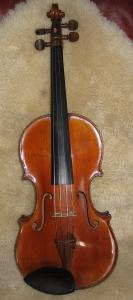
United Reformed Church
The Bright String Trio are now a regular visitor to the Fringe. And they have established the United Reformed Church as a splendid venue for chamber music. This year they had invited a talented young flautist, Anna Shipton, to join them for a delightfully elegant performance of Mozart's C major flute quartet (KV 631). But only after Anna had given short solo pieces for flute by the rarely heard baroque composer Marais and a haunting Syrinx by Debussy. The unaccompanied flute does not always sound pleasurable but Anna's musicality in these works was extremely attractive.
The trio also gave a rousing performance of Beethoven's string trio Opus 9 no1 which they tackled with enthusiastic gusto. Although a relatively early work it already gives strong hints of the way in which Beethoven would later develop the great symphonic compositions that we all know.
The programme was completed with Dohnanyi's somewhat wistful serenade Opus 10. It is always nice when a chamber group finds time to introduce the works they play. So it was most interesting to learn about Dohnanyi's rather sad life and then find how much of that sadness had made its way into this serenade.
Peter Low
A PIANO CAVALCADE - Jonathan Ellis Concert Pianist
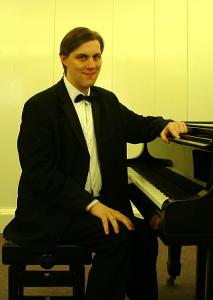
Buxton Methodist Church, 24th July
Jonathan Ellis has had a very busy Fringe. He accompanied the City of Manchester Opera in their concert performance of 'Carmen' and only the night before his own solo recital he supported soprano Margaret Ferguson in her highly successful programme. But then Jonathan is passionate about his music; he loves to play, to entertain and to talk about what he plays. You get the impression that he'd play all night if he were allowed to.
For this recital he offered a generous and challenging programme - plus two encores - played entirely from memory. Jonathan has worked hard to develop the technique to carry the performance off, but the technique alone would - of course - be worth little. As already suggested Jonathan likes to tell stories that explain something about the music and how it came to be written. Schumann was something of a unifying theme for much of this recital and Jonathan began with what he described as one of Schumann's greatest piano works, the 'Fantasy in C major'. The piece was formally dedicated to Liszt but Jonathan suggested that the real inspiration was Schumann's young bride Clara. This explains the passionate, declamatory nature of the music - full of big gestures.
The second piece in the first half of the programme did not fit with the Schumann theme as such, but Debussy's 'Images' Suite 1 offered - in parts at least - a reflective counterpart to the opening 'Fantasy'. Jonathan suggested that the Impressionist painters inspired Debussy to the extent that the opening movement of the Suite was akin to a Monet painting.
After the interval Jonathan resumed with an early Beethoven sonata - no. 2 in A major. This was written after study with Haydn and marked something of a rapprochement between the two great composers. Jonathan continued with a composition by Liszt - 'my favourite composer'. 'Three sonnets' was originally a setting of words by Petrarch and reflected his love for an unobtainable woman. Liszt too was unable to marry his great love and the unashamedly romantic nature of the music brought the best out of Jonathan.
Chopin's Barcarolle - inspired by a Venetian boating song, completed the planned programme. Chopin was not a great self-publicist but Schumann championed him. Brahms also benefited from the support of Schumann and it was his Rhapsody in G minor that Jonathan played for his first encore. Jonathan finished - with some reluctance you felt - with Liszt's arrangement of a quartet from Verdi's 'Rigoletto'. At the conclusion the applause and genuine warmth for the performance told you all you needed to know. We must hope that Jonathan Ellis returns to the Buxton Fringe as a solo performer.
Keith Savage
SEACHANGES - Selfmade Music
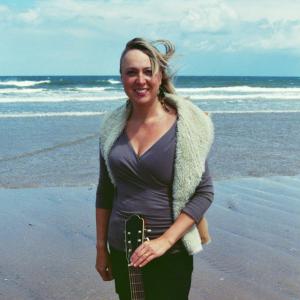
Buxton Methodist Church 23rd July 2010
Seachanges made a brief appearance on the 2009 Fringe, not long enough for many to catch it. But thankfully singer-composer Susie Self and cellist Michael Christie have returned this year with a longer run of performances.
The programme opens with Whale Song, a haunting piece set against a background of simulated whale sounds with Michael setting a compelling rhythm on a frame drum. Susie's voice begins with a resonant hum that swells into a wordless lament then into an extraordinary vocal whale song effect. The image evoked of a powerful sea creature making its lonely way through the vast oceans, sets an elegiac tone. Loneliness and sadness recur in My Heart in which Susie sings of reaching out to a lover across the sea, literally perhaps but maybe also figuratively across a dark psychic ocean. Michael's cello reflects this depth, the heavy heart, the longing.
But Seachanges isn't all about life's sadness. There's excitement evoked in the title song: Susie's rich voice repeating Seachanges against a swelling orchestral backing and shaken shells and pebbles, suggest a time of change coming, maybe dangerous but full of power and potential. There's playfulness portrayed in So You Think I've Got an Attitude. And the final piece My Art is a Song, is an ecstatic declaration of love. Susie's voice captures all these moods: the portentous, the seductive, the joyful.
Though she writes most of her own songs, Susie also takes inspiration from others' words (including some found in a Chilean phrase book). Two lovely poems by John Drinkwater, The Miracle and Amaranth, explore rebirth: the wonderful news of the reawakening of spring, the everlasting nature of beauty. They echo Susie's sea change imagery: the ephemeral but eternal rising of life from the deep and the dark.
The concert also features the premier of an intriguing set of haikus by David Sutton-Anderson set to music by Susie: the minimalist form here represented by both the words and the music again suggests the lasting impression made by the beautiful things in life no matter how short their existence.
An enchanting programme. Don't miss this opportunity to see it this year.
Barbara Wilson
SUMMER RESIDENTIAL COURSE CONCERT - Derbyshire City & County Youth Orchestra
This concert represents the culmination of the Orchestra's summer course.
The Octagon was almost full.
They concert opened with the Prince Igor Overture by Borodin with its cascade of fanfares.
This was followed by Prokofiev's Romeo and Juliet Suite No 2 with its famous and recognisable tune, also known as the Dance of the Knights.
They finished with Rachmaninov's Symphony No 2(E Minor) OP 27 - a piece of great emotional depth - altogether a very Russian evening.
It was impressive to see young people deliver music of such a high standard, capturing the moods from loudest to quietest in perfect ensemble.
No-one would expect young people to be able to communicate so well the emotional highs and lows of this romantic music. This is in part due to the full complement of lower strings and brass giving the music its Russian moody character.
Peter Stark conducted the music with extraordinary skill and provided great emotional depth to the music.
It is remarkable to be able to pay so little to hear an orchestra performing to such a high standard.
Mike Rose
ANOTHER LEFT-BRAINED, SILLY-NAMED CHARITY CONCERT - Gill Sweeting and Not the Blue Cheese Tarts
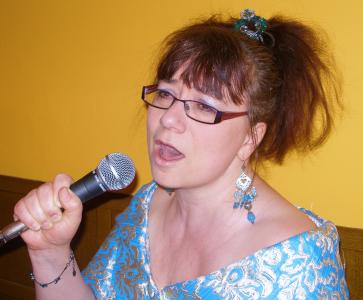
This gig brought together some of Buxton's finest, well established musicians for an eclectic evening of music making - and the audience was not disappointed.
Gill Sweeting - the Blue Cheese thread - linking all the artists has a wonderfully gritty voice, particularly suited to the more bluesy - and sometimes blousy - numbers of her opening set: Moanin', Everybody's crying mercy and Hum drum blues, accompanied by John McGrother on keyboards.
She made 'A Taste of Honey' very much her own - never mind John Lennon or SugarPuffs! Jim Lampard on tenor sax adding that certain something extra.
In contrast Bernadette de Cent, has a much more melodic and mellifluous voice, taking on Joni Mitchell's 'Court and spark' with ease; but there is power here too as she showed when she joined Gill in 'Gold in them hills' and in later numbers with fiddle player Magdalena Bezedkova. In Tori Amos' 'Gold dust', she showed that she could not only tell - but sell - the story too.
The second half leaned more towards the folk tradition of both Britain and America. Ruby 'Malarkey' Moon taking the lead here, her deeply resonant voice filling the room. Jim Davies added an American twist with a series of songs by Dan Hicks.
This was a group of the town's finest musicians - playing to their individual and collective strengths. If you missed them at The Palace - catch them tonight (Saturday) at the Grove Hotel, Grove Parade 24 Jul 8:30pm to 11pm £6.50 (Child £4.50, Conc £5).
Direct bookings via 07850 42 55 82
The profits from both concerts go to St Lukes Hospice in Sheffield - another good reason to get along tonight.
Caitlin Bisknell
ONE HEART SINGS - Moving Tone
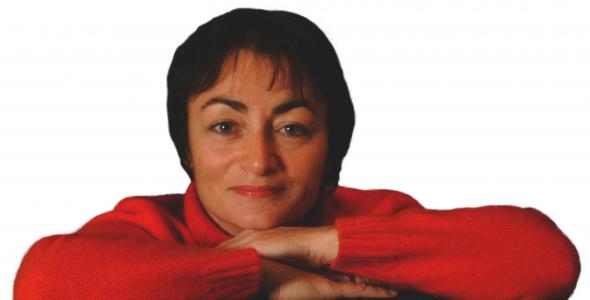
United Reformed Church 22nd July 2010
The song Moving Tone, though it comes later on in the programme, seems to strike the philosophical note of this performance: be with me in this moment, 'hear my moving tone vibrating through your bones'. And if there is one overriding impression of the concert, it is of resonance especially as expressed through Anne's vocals and her playing of the crystal bowl to produce a mesmerising hum pierced occasionally by a distant bell.
The electro-acoustic 'soundscapes' arranged by Simon Fell and Stuart Russell, and presented here by Peter Rice, sometimes echo the vocals in sound and meaning, but seem more often to contrast or to explore the underlying truth. Young Girls' Mind expresses a woman's dream of 'a bright, bright tomorrow' despite being used and abused against a soundscape of echoing footsteps as in an empty stairwell, and tolling bells marking the passing of time and maybe the death of hope. In How Can I Live at the Top of a Mountain, the brave intentions of a young man to defy convention and marry beneath him contrast with instrumental discordances, drones, and scraping, perhaps representing harsh reality and opinion.
Some of the songs seem to explore the origin of meaning in human speech. The words of Mise Eire - I am Ireland - appear to grow out of the opening wordless elegy, swell and soar, before merging again into the haunting lamentation. In The Necessary, a wry look at the current economic situation, you might say the message is lack of real meaning. The cacophony of consonants and vowels form into syllables and eventually into words and sentences, but we really any the wiser? Does anyone really understand what's going on? The Necessary shows Anne's extraordinary inventiveness, vocal flexibility, and theatricality as she visibly struggles to articulate the ultimately empty words.
Rainy weather and a mid-day time-slot perhaps kept people from venturing away from their comfortable pub lunches to listen to Anne Ryan's concert. It's such a shame that an audience of only two had the opportunity to hear her.
Barbara Wilson
SECRETS OF THE HARP - String & Song
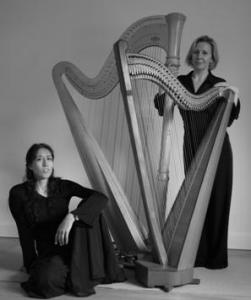
After experiencing the informal harp show at Underground Venues, I ventured to see what String & Song would be like in the more formal surroundings of the Methodist Church. This was billed as the secret life of the harp, in a lecture-recital format.
So now genned up, I was expecting great things, and I was not disappointed. It really is a lovely reverberant acoustic in the Methodist Church, and it suited the miked-up harps well. Over the evening, the features and history of the harp were well explained, levers, pedals etc and jokes were sprinkled in for good measure - I liked the tall and short gag at Kathryn's expense.
The audience were both accepting and encouraging, for which the Fringe is renowned and also has a reputation of allowing artists to experiment with sometimes risky material. Risky musically of course, and I would not have guessed that Kathryn Lewis had only been playing for ten years, and absolutely mastered the tricky Britten Interlude with it's amazing ethereal sound, harmonics - a totally absorbing performance.
Liath Hollins showed her mastery too in the tricky arrangement of Debussy's 'Flaxen Hair', with its many lever changes. Her singing in the folk songs was both accomplished and clear, and her introductions most knowledgeable.
The main highlights for me were those pieces of Welsh origin played as duets (Bugeilio'r Gwenith Gwyn and Cysga Di Fy Mhlentyn Tlws). These were played with a confident effortless style and the arrangements carefully written. I particularly liked the mesmerising arpeggios in Bugeilio'r with enharmonic features from the concert harp (yes F# is Gb). In Cysga, a Welsh lullaby with a darker feel, I could just detect a hint of Titanic or Adiemus, quite a lovely arrangement.
To mention a few other highlights: the Satie Gymnopodie arrangement worked well on the concert harp and the Bells of Paradise, a Derbyshire carol written for the harp duo by Kathryn was an excellent piece of original writing.
For more information on these busy harpists see www.wedding-harp.com for Kathryn and www.traditional-harp.co.uk for Liath, who has recorded her own CD.
And let's not forget to mention the high-quality and informative programme; and the excellent tea and macaroons at the interval, with the latter made by Kathryn's father.
Martin Bisknell
NONETS FOR WINDS WITH STRINGS - High Peak Chamber Players
20th July, 7.30, Trinity Church
These nine players, formed from the High Peak Orchestra, entered quite late into the Fringe, so you will only have read about them on the web and not in the Fringe programme. The ensemble played violin, viola, cello, bass, flute, oboe, clarinet, bassoon and horn.
They opened with a couple of short pieces to showcase the wind and strings by themselves. Firstly, we heard a Bach Prelude and Fugue - quite a tricky fugue having multiple close entries, the horn (Patrick Gundry-White) finding that Bach on a horn is quite a feat. I did feel that this could have done with a bit more 'oomph', more rehearsal, and perhaps sitting a little closer together might assist the ensemble.
The string trio played a delightful piece of Mozart. The style the players applied was perfect and the instruments well balanced, though with some minor tuning errors on the viola.
We were then treated to the rarely played Nonet by Martinu, inspired by beautiful Czech folk tunes. Quite jazzy in places, and reminds the listener of Dvorak who of course came from the same stable. The players were well into the groove and I enjoyed this very much.
After the interval, it was time for the main event, the Spohr Grand Nonetto. Spohr is perhaps an under-played composer from the 19th century, and his Nonet was the first piece written for this instrumental combination (1813) - others followed many years later including the Martinu played in the first half. The four meaty movements gave all players a testing time in a convincing performance and we had fun picking out the 'some enchanted evening' 4-note motif. As Mary Anderson, their leader, said afterwards, the Spohr is quite a 'white knuckle ride' - true, but her nimble fingerwork made it look so easy!
This was a most enjoyable evening and I hope the group develop more repertoire to help reinvigorate chamber music on the Fringe.
Martin Bisknell
ORDSALL ACAPELLA SINGERS' BUXTON SUMMER CONCERT - Ordsall Acapella Singers
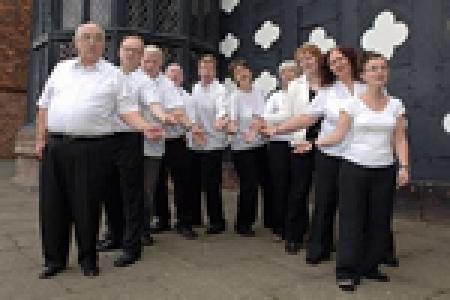
A genuine a capella choir, very smartly turned out with pink rose button holes, and singing unaccompanied works, not only gospel-type songs usually associated with such groups, but well known secular songs like "How much is that Doggy in the Window" and John Lennon's "Imagine" And with considerable assurance and discipline encouraged by their musical director and conductor, Geoff Borrowdale.
This was their first visit to the Fringe and they made the most of it singing with evident enjoyment. The programme had sensibly been chosen with care to ensure that what they sang was well within their abilities. So the result was most pleasing. Occasionally the audience were encouraged to participate by clapping in time to the rhythm and at one point were even called upon to stand and sing a simple song as a round with appropriate arm and body movements.
As is not unusual in Buxton in Summer the rain was lashing down on the carnival procession but Ordsall singers made the sun shine in St Mary's!
Peter Low
RENAISSANCE AND BAROQUE MUSIC RECITALS - Partita

Partita is an early music ensemble which is a regular and welcome stalwart at the Fringe. They perform with an array of period instruments - everyone plays several at least - and two (Sasha Johnson Manning and Holly Marland) are also singers of remarkable accomplishment. The musicianship of all the members jointly and seperately is deep and notable, and their repertoire is wide-ranging, from the Renaissance onwards, including both sacred and secular.
This concert was a solo recital by Roger Child on lute, theorbo and baroque guitar, with music from Italy, Spain, France, Germany and England of the 16th to 18th centuries. These plucked string instruments make mostly small and delicate sounds, and the music often sounds as though the composer / performer is thinking quietly, conversing with the instrument, and the audience is merely eavesdropping.
The first pieces, on theorbo, were from the very beginnings of Renaissance lute music, the title of one 'Tastar de corde' (touching the strings) suggesting the almost tentative nature of the music. Three 'grounds' followed, in which a regular repeating pattern serves to carry variations, and included one by Purcell. The theorbo, with its very long neck and thus some very long strings, demonstrated an impressively solid bass note when required.
The next section was for the lute, and then a return to theorbo, covering pieces of 'Despaire and lawful merriment', mostly by John Dowland, king of English lute composers. 'Sir John Smith his Almaine' is a cheerful dance, and 'Semper Dowland simper dolens' (ever Dowland ever doleful) the other end of the emotional spectrum: the Elizabethans liked melancholy. A group of late 17th century Spanish pieces for baroque guitar was extrovert and rhythmic, even showing a faint hint of flamenco, but pieces from the court of Louis XIV were quieter again. Finally there was a selection of theorbo music from France and Germany, featuring JS Bach in the context of his contemporaries, the sound of the theorbo in some contrast to his organ music recently heard in Buxton.
There are two Partita concerts yet to come, a lute song recital at 1pm on Wed 21 July at the Methodist Church, and the full Partita ensemble at 7.30pm on Thursday 22 July at St John's Church. The fan club will want to get to both.
Ursula Birkett
STRING AND SONG - Liath Hollins & Kathryn Lewis
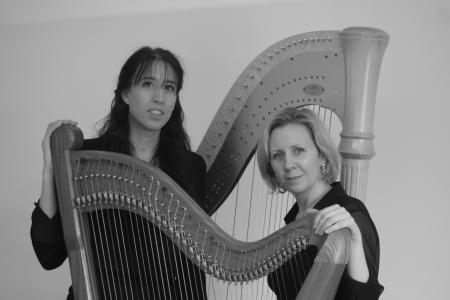
Remaining shows: 22-23 Jul, 2.30-3.30pm, Barrel Room, Old Hall.
Well a big Fringe welcome to new act String & Song, a harp duo comprising Liath Hollins and Kathryn Lewis.
They are in fact on the Fringe in two guises, one performing a potted history of popular music as interpreted by the harp in the Barrel Room, and also a more serious recital in the Methodist Church on the 21st July with more beautiful music, friendly chat and everything you wanted to know about harps but never got near enough to a harpist to ask - are they really tuned in C flat? (yes they are!)
So what of the show at the Barrel Room? Well, I thoroughly enjoyed it. A good-sized audience was warm to the duo and indeed some banter crossed between the two. There was a relaxed atmosphere and we were entertained to 'popular' music. - defined as music which has or had wide appeal in terms of fans and record sales. The varied program was mostly alternated between the two harpists and Liath also sang to a few of the folk items.
Don't expect all film scores and pop tunes, but you will enjoy a wide range of music including Vivaldi, Arne and Bach together with Irish melodies, folk songs and pavans mixed with Glen Miller.
This was a whistle-stop tour of popular music over the ages, ably performed by experts of this often miscast instrument and in such a friendly manner with good natured banter and repartee. A quite delightful way to spend an hour of the afternoon.
For more information and perhaps to hire them for a wedding or other event, check out www.wedding-harp.com. They also have a CD that can be bought at the event.
Let's hope they come back next year.
Martin Bisknell
FORBIDDEN SACRED: MUSIC FOR AN ENGLISH CAVERN - Bright Cecilia
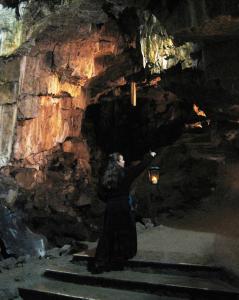
This 'Music for an English cavern' comes with a Health Warning - dress warmly, the temperature in the caves is 7 degrees C, which feels cold in even a Buxton summer!
Bright Cecilia is a 3-person group of singers, all students of early music from York University. They took us literally underground for a concert of sacred music in Latin, which became forbidden and dangerous after the English Reformation made Catholics into presumed traitors. Much of this music was physically destroyed at the Dissolution of the monasteries, and is thus lost to us, but some continued to be used in secret by Catholics, and has survived. Some of it was written post-Reformation by Catholic composers, a few of whom had privileged protection - William Byrd was a favourite musician of Elizabeth I, Richard Dering was organist to Queen Henrietta Maria. One piece performed in this collection was preserved because the manuscript paper was used as scrap during the preparation of a large building enterprise and then archived.
The audience was led through Poole's Cavern in atmospheric darkness, with pools of light as needed but never more than just enough for safety, the singers using booklights. They introduced the pieces as we moved from one place to another (no programmes as no light to read them by) explaining the historical context in a way that really increased the impact of the music, as did the secret or hidden location, the darkness, the fantastical shapes of the stone above and around us, the occasional drips of water, and the wonderfully resonant acoustic.
They gave us music spanning 150 years, from 1470 to the 1640s, so the styles went from the plainest chant to something lilting and almost modern sounding (Wikipedia refers to Dering's "wayward modulations and dramatic expression"). Some of all this is perhaps more interesting than winning, but some is just downright enjoyable, even to an ear not trained to the sparseness of early music. Knowing the dangerous circumstances of its composition and use made the quiet devotional tone, the thoughtfulness of it, very compelling. (Your reviewer sings the classical choral masses of later centuries, and is thus familiar with much of the Latin used here. Those who know no Latin are in the position of many of those who once risked their liberty and perhaps their lives to listen to it.)
The most famous of the composers featured was William Byrd, whose Mass for 3 Voices was sung in various different locations in the cavern, definitely interesting, and definitely beautiful. We also had 2 of his settings for the canonical Hours of worship. There was much else, including a deeply touching pre-Reformation setting (by Anon) of St Luke's account of Christ's Passion, the earliest polyphonic setting of the Passion, and thus a distant ancestor of JS Bach.
The singers (mezzo, tenor, bass) were unaccompanied, true and pleasant to listen to, nicely blended, their sound enhanced by the resonance of the cavern, as well as by the atmosphere and visual impact of the surroundings. They also made their introductions in such an easy and comfortable was that the audience was at ease too.
This show repeats on 19th and 20th July. If early vocal music appeals to you at all, this is a most unusual opportunity, and not to be missed.
Ursula Birkett
EXCITING FILM & LIGHT CLASSICAL MUSIC - Fordante
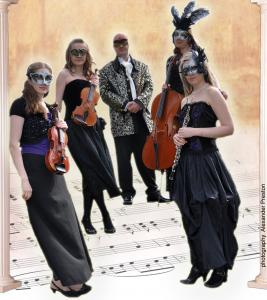
Fordante is a group of professional musicians forming an ensemble, performing their own music alongside popular film theme songs. Three string players join forces with an oboist and keyboardist, with occasional electronic backing tracks. The group has only been around since late 2008.
All the music of the group is either composed or arranged by the keyboardist Phil Mountford and resembles the style of Karl Jenkins (as in 'Adiemus') and others in its minimalist style with floating melodies contrasting with rhythmical passages. It creates a cross-over between traditional classical music and the more accessible film scores we all know and love. Themes from well known films such as Dr Zhivago and The Godfather are incorporated between home-grown items.
The afternoon programme (essentially the first half of the longer evening concert) gave a taste of the group's talent, both in their most musical performance and the original compositions. They aimed to make the music accessible and enjoyable, and hit the mark on both counts.
These are highly-accomplished musicians who play with a clear passion and I will be following their progress with much interest - what will be their next project?
In May this year, the group recorded the album 'The Arrival' which contains many items from the Fringe programme, check out www.fordante.com to order the CD.
Martin Bisknell
CONCERT - High Peak Orchestra
The High Peak Orchestra's concert on the Fringe is a reliable pleasure each year, and again this time. Programming includes the orchestral standards, standard for good reason, with a leavening of the less usual, and this one fitted that pattern neatly. The level of performance similarly fitted the pattern, good so that the listeners could relax confidently, even if sometimes with a slight sense of danger - adding to the excitement.
These days we can all access almost any music played by professionals of marvellous ability and polish, and listen at any time and almost any place, but there is something extra in the live performance, and something completely different for those performing, inside the music. Where they are amateurs, the end result will probably lack the professionals' polish and definition, but the immediacy and the enthusiasm communicate themselves to the audience, and the Fringe is surely a highly suitable place for such endeavour and enthusiasm.
The programme started with Tchaikovsky's Romeo & Juliet fantasy overture, familiar sweeping tunes painting pictures of the well-known story, Montagues & Capulets clashing, and the great love theme and its doomed ending. Tchaikovsky revels in the use of the full orchestra in full swing, as well as his more delicate moments.
Erich Korngold's Violin concerto in D major followed , with Oliver Nelson as fleet-fingered soloist. Korngold was a child prodigy in the manner of Mendelssohn, who is now remembered most for his very successful career composing film scores in Hollywood, for which he won two Oscars. His film music was lush and tuneful, and he uses some of it , to great effect, in this concerto, written for Heifetz, and not now very often performed. The busy solo line rides sweetly above the warm orchestral accompaniment, and the cadenzas are dazzling. The soloist seemed very much in control of affairs, and the difficulty of the music for the performers didn't stop the (or us) enjoying it thoroughly,
The evening finished with Brahms' 4th Symphony, a work which may be carefully analysed to display its interesting forms and craftsmanship, or, equally, enjoyed as "just" a ravishing sequence of sounds. It is part of the regular orchestral repertoire, and familiarity breeds only admiration and pleasure. The large orchestra is used to the full, and Brahms makes great demands on the conductor's and players' skills. Once again the pleasures of immediacy outweighed occasional roughness or imbalance.
You can't hear them again on this year's Fringe, but make a note for 2011!
Ursula Birkett
KATUS IN CONCERT - Katus
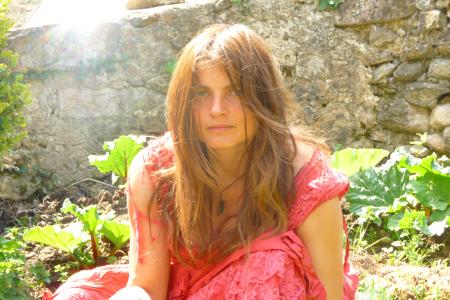
The Marquee, Poole's Cavern
16 July (and in Poole's Cavern, 17 July)
Katus played on the Fringe two years ago and was an immediate success - she then featured in the launch of Fringe 30 at the Buxton Opera House in November 2008. Illness kept her away last year so it was good to see her back in Buxton.
She brought some friends with her - Paddy Rogan (guitar), Kate Young (fiddle) and Marit (mandola/mandolin). Between them they delivered a warm, rich and absorbing set of what would probably be described as 'folk' or 'world' music, drawn primarily from a wide-range of European sources.
Katus began with a piece played on a Chinese instrument - that looked a bit like a recorder but sounded more like a bagpipe. She then sang a Bulgarian song unaccompanied before singing a song of her own in Czech. It came out of a tongue twister that translates as (I think I heard correctly) 'if people had fishes up their bums, there wouldn't be any lakes'. There is an impish sense of humour in much of Katus' music. She then sang in Gaelic accompanying herself on flute (singing through the instrument in parts). It seemed that Katus was keen to bring as much variety to the music as possible.
For the rest of the evening it was mostly duets, trios and quartets. Kate and Paddy joined for a song written after a visit to New Zealand that had a chorus including 'does anybody know, can anybody tell me where the water goes when the tide is low?' Katus' songs are often to do with her experiences of, or encounters with, water. Her singing style is not especially conventional - the way she runs at words and phrases reminded me just a little of early Joni Mitchell but her voice is quite different.
Marit - on mandolin - joined to make a quartet for a new song that they had been rehearsing in the garden - again a reminder that Katus often writes and sings about the physical world and it would make sense to play and hear it there.
There was time for Kate to sing a lullaby - using a lyric by Sir Walter Scott - and Paddy to offer his version of 'She moved through the fair' before the quartet rounded off the evening with a Canadian tune - 'The Seafarers' Song'.
A small, but appreciative, audience enjoyed every minute and the sustained applause was heartfelt and well deserved.
Katus, Kate and Marit play in Poole's Cavern on 17th July, 'a different set - a lot of improvisation' - wrap up warm and wear a hat. After all the recent rain there will be plenty of water droplets.
Keith Savage
JAKE THACKRAY RIDES AGAIN - Keith Smith

Jake Thackray holds a unique place in the history of British music. A man who was a folk troubadour, a Jacques Brel-like chansonnier, a man who combines a Wildean wit with the morbidity of a Morrissey.
In this charming and hugely entertaining concert, Keith Smith brings Thackray's songs to life again. At the start of the show, quipping that it should have been called 'Fake Thackray', Keith says that he isn't attempting to provide a kind of Jake Thackray tribute band.
It is no criticism to say that this is, in many respects, exactly what he then does. You can't really sing Thackray's without singing them like Thackray. The uniquely flat Northern vowels, coupled with consonants as crisp as a Coward are recreated exactly, the diction is crystal clear so that all of Jake's wit is audible.
I would say that most of the audience were Thackray fans, but Keith isn't just preaching to the converted. Anyone would enjoy this crisp, funny, poignant, thought-provoking reminder of a great British artist.
Robbie Carnegie
SAM DUNKLEY LIVE - Sam Dunkley
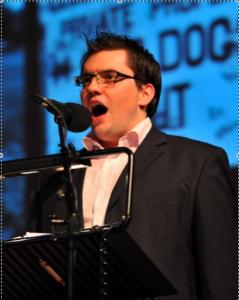
They say you can tell in the first few minutes if show is going to be good and this was the case with Sam Dunkley. Sam treated us to a selection of well polished folk songs and contemporary music, dispersed with relaxed and friendly chat introducing each piece. Sam plays the piano, Turkish drum or guitar whilst singing, almost, to perfection. He has an effortless style that makes it all look too easy.
Sam performed the classic Irish folk ballad 'Galway Shawl' beautifully and has the voice and style to carry the piece. Every song seems to have a personal edge and this is especially evident with the song he wrote himself, 'Life got in the way'. However, Sam can do the less serious pieces too and we were entertained with 'Chavs on the Moon' and others songs. Sam also encourages audience participation, so don't be afraid, get involved and sing the chorus.
The informality of the act suits the intimate atmosphere of the underground venue, where the audience is very close to the action.
I had a great time and if you appreciate live music then Sam Dunkley is definitely worth seeing. I'm going again!
Peter Stacey
THE TIDESWELL MALE VOICE CHOIR SHOW - Tideswell Male Voice Choir
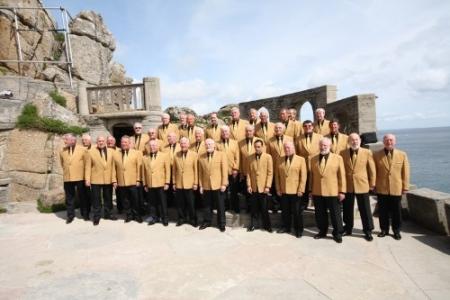
St John's Church
14th July
Each year there is one show on the Fringe that catches you by surprise, which really bowls you over, which leaves you feeling so glad to have been part of it. Almost certainly the TMVC Show will be my Fringe 2010 highlight. This is hard to explain in all sorts of ways. OK, there is something almost inevitably moving about hearing 40 and 70 voices singing together - sometimes in unison, sometimes in 4-part harmonies. I know none of the TMVC but there are some rum looking buggers amongst them - how come they can sing so tenderly and poetically when together?
The Choir seems to be genuinely inclusive; clearly some individuals have strong voices but it is equally certain that some members have pretty average voices, but that doesn't matter. What matters is that they are together, sharing what they do, representing a small village that no one very far away has ever heard of. The TMVC is an amateur choir but it takes its work and purpose very seriously and this is evident by the concentration and attention given to director Dennis Kay.
Pianist Chris Ellis brilliantly supports the choir; his playing is always sensitive but not intrusive. He had just one solo spot, dazzling with Earl Wild's arrangement of Gershwin's 'The Man I Love'. Also on hand for the show was Choir organist Mary Cobbold who told some delightful stories about when she first played on the St John's organ when she was 11 (must have been about 30 years ago then Mary?) and "was let loose with the choir". She played two pieces on the organ that she was taught on, including Widor's Toccata, recalling how she had begun the piece in error many years ago and it served as a rather grand introduction to 'O Come All Ye Faithful'.
Dennis Kay has been closely involved with the 'Come and sing project' which has brought about 35 men together and, over a period of 10 weeks, has - in the words of one of new singers - "taken me out of my comfort zone and taught me things about singing that I never knew." This new, embryonic choir performed for the first time. So at this show we had two choirs that sometime sang separately and sometimes together. So, what did they sing? In some ways it hardly matters but these are some of the highlights (for me, anyway).
The TMVC opened the evening with four pieces - the last of which was "Unchained Melody", almost heavenly in its arrangement. The only sound you heard from the audience all night was rapturous applause. The new, infant choir wasn't given an easy introduction to concert performance. Their first two numbers being 'The Grand Old Duke of York' and 'You'll Never Walk Alone'. Both were sung in a controlled manner leaving you to concentrate on this performance.
After the interval the choirs came together for show-stopping performances of 'There Is Nothing Like A Dame' and 'When the Saints Go Marching In'. The TMVC sang two items from their forthcoming CD - 'What a Wonderful World' and 'Hallelujah'. An interesting pair of songs - Louis Armstrong's song being naïve and sentimental and Cohen's (even bowdlerised) a desperate, aching song of love gone-wrong. To hear them side by side was a reminder of the range of the choir.
There was time for a preview of the show to come at the Buxton Opera House on October 24th before - appropriately on Bastille Day - two blistering rally calls from 'Les Miserables'. The Tideswell Male Voice Choir may not be the most obvious leaders of political revolution in the High Peak and Derbyshire Dales - but who knows?
The Choir is in Tideswell - with a chamber recorder orchestra - on 24th July; call 01298 77947 for tickets before it sells out. Similarly the Opera House concert on 24 October will sell-out quickly.
Keith Savage
MUSIC EVENT - Burbage Primary School
The pupils of Burbage Primary School gave their end of year musical performance to an enthusiastic audience of parents, siblings, fellow pupils, general fan club, and one Fringe reporter. The buzz as everyone gathered was not quite like a formal concert hall, but equally full of anticipation. We all enjoyed ourselves thoroughly, the performers communicating directly and cheerfully, surely just as they and their teachers must have hoped and worked so hard to achieve.
They began with Variations on Frère Jacques, performed by the School Ensemble, on violins, cello, flutes, guitars (though I may have failed to spot other instruments), led by the piano. Obviously a performance by primary school children was never going to be immaculate, but they concentrated totally, kept together wonderfully, and reflected much credit on their teachers and themselves. Being part of the music is surely the best way to learn to listen and to love it, and these children gave every sign of doing both those things.
The second part of the concert was Roald Dahl's Gigantically Amusing Jack & the Beanstalk, by Matthew White and Ana Sanderson, music by Georg Peleci, performed by Mrs Hawkins' Year 2, and Mr Horvath's Year 4 - plus Giants from a senior year. The stage was crowded with farm birds and animals (masks and headdresses) and beans (green costumes and headbands), market traders (striped aprons), the family cow (which explained the facepaint on one young violinist), and 2 each of Jack and his mother: the 3 giants (fee, fi, fo, fum) appeared later. The entire cast sang their hearts out, facing front, heads up, words clear, a lesson to many an adult choir. The words and music were catchy and colloquial, even a shade brutal sometimes, in Dahl's characteristic manner - thus a sad farewell to cow en route to market "send a postcard from the abattoir". The magic beans grew and swayed, the two Jacks 'swarmed' up them to get the golden leaves, confronted the giants, rushed down again empty-handed, the two mothers went up instead and fell victim to the giants, "By Christopher, by gosh, by gum, the giant's eaten up my mum". The joke about "smelling" the intruders allowed for several jolly choruses about cleanliness, the boys scrubbed up, thus evading the giants, and ended up with bags of gold, hurrah.
The evening ended with a reprise of the most rousing chorus, and we all dispersed happily. We tend to hear of difficulties and cuts in school music, but it is evidently alive and well in Burbage Primary School
Ursula Birkett.
SOUTH & NORTH AMERICAN PIANO DUETS - Emma Souza Lima & Diva Evelyn Reale
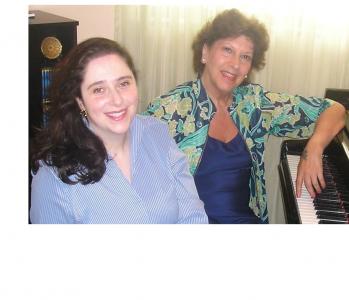
Apart from Villa-Lobos, Brazilian composers of the nineteenth and twentieth centuries are not very well known in the UK. So it is great to have two enthusiastic Brazilian pianists, Emma Souza Lima and Diva Evelyn Reale, introducing us on the Fringe to the classical music of their countrymen. A wide range of compositions was performed and through them all one could detect the strong Latin American rythms that underpin the works. Of particular interest was the Cirandinha by Octavio Maul with its hints of the tarantella and the Valsa by Altino Pimenta which made us want to leap from our seats and swirl around the room. Villa-Loboas was also featured with a charming piece A Folia de um Bloco Infantil.
These are musicians of very secure technical competence and their ensemble was equally impressive. Clearly they respond with sensitivity to each other's playing so that the result is a very musical performance.
Having taken us on a whistle-stop tour of Brazilian composers the programme concluded in North America with some familiar songs by Cole Porter and Gershwin's Rhapsody in Blue played with fiery intensity.
Peter Low
HIGHLY RECOMMENDED - Amaretti Chamber Orchestra
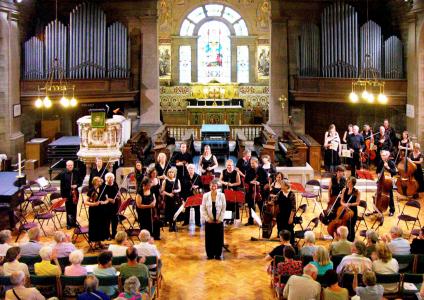
The Amaretti Chamber Orchestra - based in Cheadle Hulme - has become a Fringe fixture in the 6 years since its formation. It is also hugely popular and a good-sized audience showed their appreciation for what was an infinitely more rewarding evening than the competition offered by the World Cup Final.
Though the Amaretti is an amateur orchestra the players are highly accomplished and have plenty of experience with chamber ensemble and symphony orchestras. This accomplishment was confirmed by conductor Richard Davis who revealed that the programme had been prepared with just two rehearsals - not that it ever sounded under-rehearsed.
One of the pieces was especially composed for the Amaretti and this was a world premiere. Composer Nick Simpson was present to provide an explanation for how 'Variations on a theme of Handel "He was Despised" - an entertainment for string orchestra' came about. It seems that the composition was therapeutic for him - beginning with a sense of self-doubt and insecurity and ending with the recognition that things were not so bad, 'It occurs to me that I am Not Dead Yet'. The 15-minute piece begins with a statement of the theme before more agitated and fragmented phrasing - often in higher registers - imply voices of doubt within. As the 'entertainment' progresses more sweeping, buoyant sounds hint at a greater sense of certainty and security. All of this is confirmed in the brisker final section where a sense of self-confidence is established. This is not 'difficult' contemporary music and it is to be hoped that it becomes a feature of the Amaretti repertoire.
Three smaller, familiar and popular items were included - each played with sensitivity and purpose. Purcell's 'Chacony' opened proceedings and immediately you were struck by how well the Amaretti is suited to the acoustic of St John's - the sound was warm and round.
The first half ended with one of Corelli's 'Concerto Grosso' and after the Interval we were treated to Barber's 'Adagio for Strings', the long lines of which were delivered with the necessary precision.
The main - and final - piece of the programme was Tchaikovsky's 'Serenade for Strings in C Major, Op. 48'. I'll have to admit to a problem with Tchaikovsky - the older I get the more I seem to find his music insistent and bullying. He just won't let you think for yourself. However, his music was beautifully played. The contrast between the big, big dramatic first movement and the modest gaiety of the following waltz was perfectly realised. The elegy and finale showed the Amaretti at their best as an ensemble. They are fortunate to have such an experienced and persuasive conductor in Richard Davis who managed things firmly and brilliantly.
The proceeds from the concert will go to the Leonard Cheshire Foundation. The next Amaretti concert is on 25th September - see www.amaretti.org.uk
Keith Savage
SOPHIA LIVE - Sophia

The Barrel Room, 10 July (and again on 18 & 24 July)
Performing alone in front of strangers is a risky business and takes bravery. That should never be underestimated. Sophia's solo Buxton debut wasn't easy, it seemed (though I had heard her at the Fringe launch party in the same venue a few days earlier when she was much more relaxed).
She sang to a backing track - fair do's she could hardly be expected to employ a sizeable band to support such a small gig as this was bound to be. Whether this was a late change of plan I wouldn't know - the programme promised a stripped-down acoustic set - but it did put something of a barrier between Sophia and her audience. The expected intimacy didn't really materialise.
Sophia has a voice that carries the sort of material she chooses well - you may be familiar with Stevie Nicks' 'Edge of Seventeen' or this year's X-Factor anthem 'The Climb', for example. It may help her to work alongside other singers for a while as she develops her stagecraft and gains more experience.
Keith Savage
CARMEN - CONCERT VERSION - City of Manchester Opera
What Bizet wanted to do with Carmen was introduce Parisian audiences to the exotic world of gypsies,. their unconventional lives and independence of spirit. I wondered if a concert performance could adequately convey Bizet's intentions. I need not have worried. City of Manchester Opera gave a sparkling performance which effortlessly communicated the contrasts between free thinking Carmen and her co-workers from the cigar factory on the one hand and the conventional Don Jose torn between his obsession with Carmen and his mother's hope that he might marry Micaela.
The company had elected to sing in French and had thoughtfully provided a large screen for sur titles in English. When not being used for that, various pictures of Seville or the smugglers hideout were projected which was a clever way of helping to create the appropriate backdrop to the action.
There were so many good moments in this performance but for me I was particularly moved by the Don Jose's (John Elliot) duet with Micaela (Rachel van Heel) in Act 1 and by the splendidly powerful singing of Helen Gregory whose rich tones were perfectly suited to the role of Carmen,
Chris Gill encouraged the chorus to sing with infectious gusto while Johnathan Ellis performed wonders on the piano. Altogether a magical evening.
Peter Low
HAYDEN'S RANTINGS OF A YOUNG FOOL - Hayden Cohen
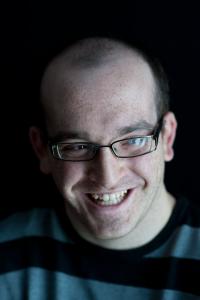
The Barrel Room, Underground Venues, 9th July (and on 11th and 13th)
Hayden Cohen poses a problem for any reviewer. His rants (if that is what they are - we'll come back to this later) are primarily against a society that wants to classify, pigeonhole and define: a society that won't tolerate or allow individuality. So how can we describe what he does without reference to others - recognising the uniqueness of Hayden Cohen?
In his own promotional material Hayden suggests similarities with Woody Allen and Elvis Costello. Neither seems quite right - though he too does wear glasses. (Hayden offered just a token love-song as he described it; much of Costello's and Allen's work, on the other hand, is shaped by their relationship experiences). Hayden doesn't really seem all that angry; he sounds as though he thinks he ought to be angry, but he can't quite make that step from a sense of frustration to something more profound.
You see Hayden is a totally committed, positive performer. He believes in what he is doing with a passion. Hayden loves words, songs and literature and pleads that we see the beauty in them - rather than nullify their impact through criticism. There is no cynicism in his performance - despite what he says in the Fringe programme notes. It is this sense of purpose - that with effort we can in some way change our lives and ourselves that wins the audience over to Hayden's side.
He mixes up songs - mostly wordy and delivered at pace - poems (which develop from colloquial beginnings to something richer) and a couple of pieces on Spanish classical guitar. He has a strong voice and a confident guitar-style
The audience for the opening show was distinctly not young - average age 60 probably. The enthusiasm for Hayden was real - perhaps there was admiration for his determination to be himself, not to give in. It would be interesting to hear what an audience half the age made of Hayden, who is anything but a young fool.
Keith Savage
PROJECT ADORNO'S TOP TEN OF POPULAR CULTURE - Project Adorno
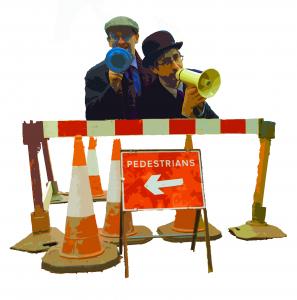
The Barrel Room 9th July (and on 10th from 2.30-3.30 p.m.)
I've never got around to asking Project Adorno (PA) quite what their take on popular culture is - from a theoretical/philosophical perspective that is. I had always supposed that their view was that popular culture in some way seduced and pacified the population as a whole and is, therefore, a bad thing. (My reading of Theodor Adorno's work is very limited). The more I see PA, however, the more convinced I am that they really love elements of popular culture and aren't too bothered about subverting the influence it has.
This year's show is essentially a repeat of last year's; I loved it then, I love it now. I accept that PA are an acquired taste - they're a sort of mix of Gilbert & George, Pete & Dud and the Pet Shop Boys and offer a loving take on aspects of English (rather than British) culture set to techno type tunes.
As the title suggests the show is loosely hung around a list of recreational and leisure activities drawn from Social Trends data. PA's background is more literary and musical than, say, sporting and their affection for Darts (the band, not arrows), early computer games consoles (Sinclairs and Commodores, not Amstrad) and Sci-Fi seems entirely genuine. As middle-age looms they are able to recognise that future recreations could include being part of the National Trust. They don't seem totally dismayed at the prospect, and the rhyming of 'appealing' and 'Darjeeling' is inspired.
Other songs debate the sexiness - or otherwise - of Jeremy Paxman; piers as a metaphor for death; dispute the way in which football supporters assume identity with their team (as in "we need a new goalkeeper").
The final song starts by asking "If you were a motorway, which one would you be?" As a London-based Project they feel defined by the M25. It may not be a question that makes so much sense in all parts of the country.
I'd happily sit through this show every week - proof that popular culture pacifies? We might need a call to action before long. There's a challenge PA - see you next year I hope.
Keith Savage
TELL THE CHILDREN OF TINY THINGS - the Tallyman's dark OMNIBUS
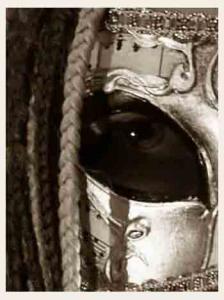
The Tallyman pulls on political and social views many of us do not wish to confront or be confronted with. This created an uneasy atmosphere (as I think was desired) and you were never sure whether to laugh or cry.
The story's were very chilling and challenging; I think maybe too challenging for the middle aged middle-classed members of the audience. Never mind the subject matter, whether shocked, offended or alienated never once did the audience appear disengaged. This was definitely not a clichéd performance.
The Tallyman is a fantastic storyteller; taking us from the yuppies of London to the aged whores of Sicily through song and Artaudian staging. His ingenious way with words and his musical talent did not fail to impress despite his slightly incompetent sound man.
The famous west country attitude did not disappoint and he ended his performance with the words of the west country's most famous poet:
"if we shadows have offended think but this and all is mended . . ."
Engaging irony at its best.
Katie Collins